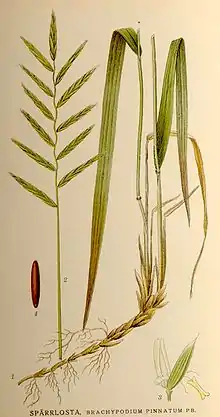Brachypodium pinnatum
Brachypodium pinnatum, the heath false brome[2] or tor-grass, is a species of grass with a widespread distribution in temperate regions of the Northern Hemisphere. It typically grows in calcareous grassland, and reaches 70–120 centimetres (28–47 in) tall. The flowerhead is open, with 10 to 15 erect spikelets.
| Brachypodium pinnatum | |
|---|---|
 | |
| Painting by the Swedish botanist C. A. M. Lindman[1] | |
| Scientific classification | |
| Kingdom: | Plantae |
| Clade: | Tracheophytes |
| Clade: | Angiosperms |
| Clade: | Monocots |
| Clade: | Commelinids |
| Order: | Poales |
| Family: | Poaceae |
| Subfamily: | Pooideae |
| Genus: | Brachypodium |
| Species: | B. pinnatum |
| Binomial name | |
| Brachypodium pinnatum | |
Distribution
The plant can be found in such US states as California, Massachusetts, and Oregon.[2]
Ecology
-1.jpg.webp)
Blooming next to low garden wall
The caterpillars of some Lepidoptera use it as a food plant, e.g. the Essex skipper (Thymelicus lineola). It is also one of the most important host grasses for Auchenorrhyncha in central Europe.[3]
See also
References
- C. A. M. Lindman (1856–1928), taken from his book(s) Bilder ur Nordens Flora (first edition published 1901–1905, supplemented edition 1917–1926?).
- USDA, NRCS (n.d.). "Brachypodium pinnatum". The PLANTS Database (plants.usda.gov). Greensboro, North Carolina: National Plant Data Team. Retrieved 10 January 2016.
- Nickel, H. (2003). The Leafhoppers and Planthoppers of Germany (Hemiptera, Auchenorrhyncha): Patterns and Strategies in a Highly Diverse Group of Phytophagous Insects. Sofia, Moscow: Pensoft and Keltern: Goecke & Evers.
External links
Wikimedia Commons has media related to Brachypodium pinnatum.
This article is issued from Wikipedia. The text is licensed under Creative Commons - Attribution - Sharealike. Additional terms may apply for the media files.